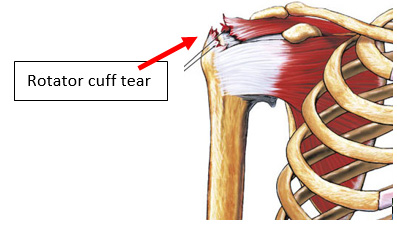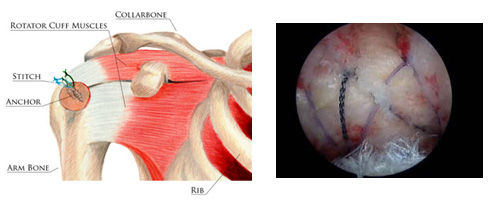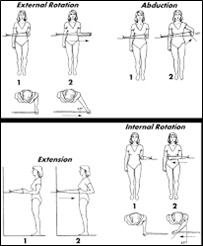The rotator cuff is a group of 4 tendons that connect the muscles of the shoulder blade to the top of the humerus bone (humeral head). They function as a unit to keep the humeral head centered in the joint, but also provide stability to the shoulder and strength with certain movements. Due to the complex structure of the shoulder joint and the stresses placed upon it, these tendons are very vulnerable to injury. Tears of the rotator cuff tendons most commonly occur at their attachment site. When this occurs the tendon retracts from the bone, effectively leaving a ‘hole’ in the rotator cuff. As a result of this retraction a rotator cuff tear will never heal by itself.

Tears of the rotator cuff can range from minor partial thickness tears in one tendon to full thickness (complete) tears of one or more tendons. In a partial thickness tear only some of the tendon fibres are torn. This weakens the tendon and can cause significant pain. Over time a partial thickness tear can progress to become a full thickness tear. Full thickness tears can also be the result of trauma. Symptoms will vary depending on the extent of the tear, but will usually include pain with active use of the arm, night pain, and weakness of the arm. Full thickness rotator cuff tears can also occur due to the normal wear and tear of age, with approximately 30% of patients over the age of 70 years having a tear.
For symptomatic rotator cuff tears there are 2 options for treatment:
Non-Operative Treatment
Because the tendon does not heal by itself non-operative treatment is purely symptomatic treatment. It aims to reduce pain and inflammation in the shoulder and get the remaining rotator cuff muscles working more effectively. This form of treatment includes anti-inflammatory medications, cortisone injections, and exercises to strengthen the rotator cuff and scapula muscles. Although this form of treatment may be effective in managing partial thickness tears and small full thickness tears, it rarely results in long term benefit for larger full thickness tears, especially in younger patients.
Operative Treatment
The primary aim of surgery is to restore shoulder function and comfort by reattaching the tendon(s) to the bone. This is done by using little absorbable ‘suture anchors’ which are inserted into the bone. The sutures from these anchors are then used to attach the tendon back to the bone. The procedure normally takes from 60 to 90 minutes, and is most commonly done through key holes (arthroscopic), or occasionally through a small cut over the top of the shoulder. If any other damage is found at the time of surgery (bone spurs, bicep tears, AC joint arthritis) then these will be addressed at the same time. Rotator cuff repair is normally a very safe and successful operation, and it is the most common operation that I do, but it does involve a very long recovery and rehabilitation period.

Recovery after Surgery
Usually you will need to be in hospital for only one night after the surgery. I will provide you with information sheets and exercise sheets before you leave the hospital which will outline very clearly how to look after your arm following the surgery.
As a brief outline:
You will spend the first 4 to 6 weeks with your arm in a sling. This will only be removed for showering purposes or when you are doing your exercises. You cannot drive during this period.
You will then spend another 4 to 6 weeks limited to very light waist level use of the arm. This is to allow further healing of the tendon(s) whilst you continue to work on regaining ‘passive’ range of motion in the shoulder. You will be able to start driving and do very light desk type of work during this period.
More formal rehabilitation including stretching in other planes and strengthening does not begin until the 10 to 12 week mark. This is when physiotherapy can also be helpful. It can take 4 to 6 months before you are back doing even your normal daily activities with comfort and a good mobility, and you will keep improving for 18 months to 2 years.

It is important to appreciate that the tendon(s) is not fully healed until 6 months. As a result it can be 4 to 6 months and sometimes even longer before you can return to more manual type of work and/or sport.
You will need the Adobe Reader to view and print these documents. 

